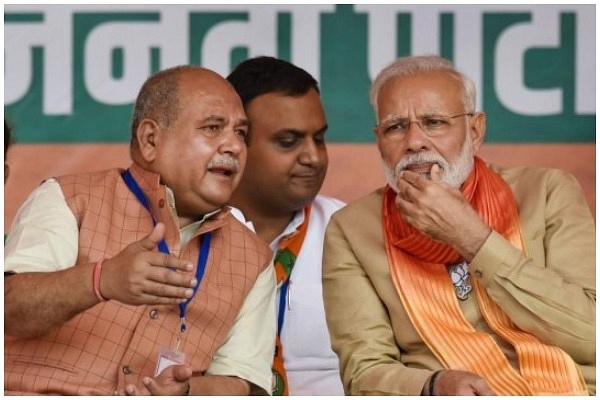News Brief
This Is How The Modi Government Can Look To Amend The APMC Act Bypassing States
- The biggest stumbling block in the recently-announced farm reforms is the states themselves.
- But the government can look to the decisions of the then UPA regime for a solution.

Prime Minister Narendra Modi with Minister of Agriculture & Farmers Welfare Narendra Singh Tomar
Union Finance Minister Nirmala Sitharaman on 15 May (Friday) announced three major reforms in agriculture while unveiling the third tranche of Atmanirbar Bharat Abhiyan to spur the economy slowed by the onset of novel Coronavirus (Covid-19) pandemic across the globe.
One of the reforms announced was to pass a Central law that will amend the Agricultural Produce Marketing Committee (APMC) Act to provide “adequate choices” to farmers to sell their produce at attractive prices without any barriers, including inter-state ones.
This announcement has, in particular, made many people curious if the Centre can come up with a law to amend the APMC Act.
The question is being raised since agriculture and agri-marketing are concurrent subjects, with states, too, having a responsibility for them.
Each state has its own APMC Act with some of them being amended in tune with the Centre’s advisory over the last few years.
Since the time when Atal Bihari Vajpayee was the prime minister, the Centre has been asking the states to amend their APMC Acts to give more freedom to growers.
The Vajpayee government had, in fact, made it conditional for states to avail of additional horticultural development funds by amending their APMC Acts.
Still, not many came forward mainly due to political compulsions and fears being spread that it would lead to multinational companies taking over.
But the Narendra Modi government need not look beyond what the United Progressive Alliance government under Dr Manmohan Singh did in June 2007 to allow farmers to sell to buyers of their choice in any part of the country.
Then, Mumbai-based Multi Commodities Exchange (MCX) wanted to launch electronic spot trading through its arm National Spot Exchange Limited (NSL).
MCX said its objective was to realise then prime minister Singh’s vision “to establish a single market across India for manufactured and agricultural products”.
The NSEL was incorporated in 2005 for this purpose. But there was one major problem the UPA government had to surmount to permit this.
How could Centre allow trading of agricultural produce through electronic trading, bypassing the states and their APMC legislations?
On 5 June 2007, the UPA government came out with a gazette notification that allowed “forward contracts of one day duration” for sale and purchase on NSEL.
The notification also amended the Forward Contracts (Regulation) Act, 1952, for this purpose.
It said spot trading on NSEL will be subject to regulations imposed by the local authorities.
The Centre also had another condition that it had the right to impose additional conditions and withdraw the permission without assigning any reasons.
The permission to allow “forward contracts” led to a huge Rs 5,600 crore scam in 2013 as traders clandestinely entered into contracts valid for as long as 34 days instead of the mandated one-day period.
Some of the companies that were members of NSEL even sold to buyers without actual stocks.
Some NSEL brokers enticed gullible investors to buy commodities on NSEL from these companies, resulting in some of them losing their hard-earned money.
These investors were promised that the companies were selling stocks as they needed working capital and they would later buy back the commodities that can ensure a higher return on their investments.
About 300 brokers face criminal action in connection with the scam, which is being heard by a local court in Mumbai.
After coming to power in 2014, the Modi government came up with its own initiative to help farmers trade across the country through electronic National Agriculture Market (eNAM).
But since many states are yet to amend their APMC Acts, and the structure lacks convergence, eNAM has failed to yield the desired results until now.
With the Bharatiya Janata Party-led government at the Centre keen to help farmers get better prices and sell without any border restrictions, the UPA government’s 2007 strategy is one that can be tried, albeit with all safeguards in place.
Support Swarajya's 50 Ground Reports Project & Sponsor A Story
Every general election Swarajya does a 50 ground reports project.
Aimed only at serious readers and those who appreciate the nuances of political undercurrents, the project provides a sense of India's electoral landscape. As you know, these reports are produced after considerable investment of travel, time and effort on the ground.
This time too we've kicked off the project in style and have covered over 30 constituencies already. If you're someone who appreciates such work and have enjoyed our coverage please consider sponsoring a ground report for just Rs 2999 to Rs 19,999 - it goes a long way in helping us produce more quality reportage.
You can also back this project by becoming a subscriber for as little as Rs 999 - so do click on this links and choose a plan that suits you and back us.
Click below to contribute.
Latest